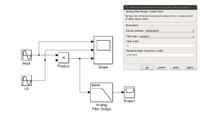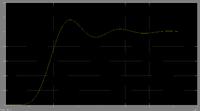mordak
Member level 5

Hey guys,
I have just started reading some stuff about mixers and tried to implement a down converter, but I tried to simulate a system level before getting to circuit design. But I got some results and at least to me they are not correct. Some snapshots of my design in Matlab are attached. frequency of both input and local oscialtor (LO) is 10kHz, so I expect to get output signal at 20kHz and DC. Then I added a low pass filter which its passband freq. edge is 1kHz, however, output of the filter is not what I expected. I assume that 2*pi*1kHz would be the cut off frequency of the lowpass filter, so its time constant is 160us. Based on this value, the output should reach its final value at 0.8ms. However, if you look at the third pic, which is the output of the filter. it shows something different. I wonder if I made a mistake somewhere.
Thanks



I have just started reading some stuff about mixers and tried to implement a down converter, but I tried to simulate a system level before getting to circuit design. But I got some results and at least to me they are not correct. Some snapshots of my design in Matlab are attached. frequency of both input and local oscialtor (LO) is 10kHz, so I expect to get output signal at 20kHz and DC. Then I added a low pass filter which its passband freq. edge is 1kHz, however, output of the filter is not what I expected. I assume that 2*pi*1kHz would be the cut off frequency of the lowpass filter, so its time constant is 160us. Based on this value, the output should reach its final value at 0.8ms. However, if you look at the third pic, which is the output of the filter. it shows something different. I wonder if I made a mistake somewhere.
Thanks



Last edited:


